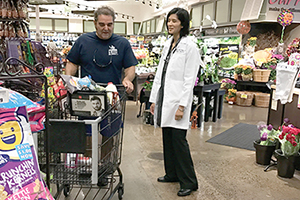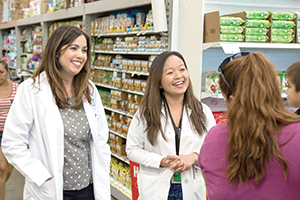By PATRICIA CORRIGAN
Many people who want to eat healthier don't know how. Some want to lose weight, but often choose low-fat foods that are high in sugar. Those who read food labels may find them confusing.

Dr. Regina Chinsio-Kwong, a family medicine physician at St. Joseph Health, helps a shopper make healthy food decisions at a Ralphs grocery store in Irvine, Calif.
Concerned about these situations — plus the high incidence of obesity in Orange County, Calif. — St. Joseph Hoag Health in Irvine initiated "Shop with Your Doc," a program that stations doctors, nurses and registered dietitians in local grocery stores to help shoppers.
St. Joseph Hoag Health is part of Providence St. Joseph Health, a system that includes 16 St. Joseph Health hospitals, with five in Southern California's Orange County, and 34 Providence Health & Services hospitals, with six in Los Angeles County.
"Over five years ago, St. Joseph Hoag Health made a philosophical and strategic pivot to be engaged with and involved in the health of communities after a multi-decade focus on sickness and illness," said Dr. Richard Afable, retiring president and chief executive of St. Joseph Hoag Health.
"Our journey over a number of years has been from sick care to health care to health, and that is the context from which we created Shop with Your Doc. We focus on the health of the community, and people now have a partner as they work to improve their health or maintain their good health."
Right-on-time advice
Shop with Your Doc began three years ago as a six-week program once a year, but now operates year-round, sending bilingual health care professionals for six hours at a time to groceries in Santa Ana, Fullerton, Anaheim, Foothill Ranch, Irvine, Newport Beach, Huntington Beach and Orange. About 40 physicians and staff members from St. Joseph Hoag Health have participated to date.
In the stores, they answer shoppers' questions about healthy choices, food labels and how to get children to eat more vegetables. They provide information about organic foods and gluten-free foods. They make dietary recommendations when individuals reveal specific health challenges. They also take free blood pressure readings — more than 500 so far — and a dozen people with "alarmingly high" readings have been sent straight to urgent care centers.
Shop with Your Doc also is one of several educational programs through St. Joseph Hoag Health that addresses obesity. In Orange County, 6 out of 10 adults and 1 in 3 children are obese. "The data is clear on the prevalence of obesity," Afable said. "The poor and vulnerable are most affected by chronic illnesses as a result, and reaching those populations is part of our mission."
Roving advisors
Afable noted that though there is no way to measure the outcome of the program, "intuitively we see the benefit of interacting with people out buying food." He added, "We have no prior relationship with them before we meet them in aisle seven at Ralphs or Food 4 Less, and we probably won't have a relationship afterward, but because we are there, we bring awareness to making good choices."
Susan Watson, a registered dietitian at St. Joseph Hoag Health, said the real strength of Shop with Your Doc is getting health care providers into the community. "People don't have to make an appointment or make a trip to the doctor's office," she said. "We are meeting people in their grocery stores, providing free education and advice."
Watson believes that being away from a doctor's office breaks down barriers. "When we walk up and down the store aisles, we always see customers looking at food labels. We can stop to help point out calorie counts or serving sizes. We also talk to shoppers about how to make quick meals with fresh food."

St. Joseph Health pediatricians Dr. Maureen Villasenor, left, and Dr. Lisa Hoang speak with a mother at a "Shop with Your Doc" event at a Food 4 Less store in Santa Ana, Calif. A goal of the program is to provide education and information to communities where obesity and diabetes rates are among the highest in the state.
Baby steps
Watson advises shoppers to buy fresh or frozen vegetables so it's easy to add two or three servings to every meal. She suggests using a cooked chicken to make several different meals throughout the week. She recommends buying fresh fruit and non-processed foods. And Watson always assures people they don't have to make a lot of big changes at once to begin to eat healthier.
Dr. Maureen Villasenor, a pediatrician at St. Joseph Health, said she is always surprised to see how excited shoppers are to interact with the health care professionals. Some shoppers, she said, have changed the contents of their carts based on her advice.
"One woman told me her fiancé had been diagnosed with high blood pressure, and she wanted to pack healthy lunches for him. She had a lot of granola bars in her cart, so together we looked at the labels, which showed that the bars had a high salt content," Villasenor said. "The woman also had a few cartons of yogurt, and we talked about their high sugar content. I suggested Greek yogurt, which is lower in sugar and carbohydrates."
A shopper who stopped to talk to Villasenor on his way out of the store had a lot of sports drinks in his cart. She asked about that, and the man said he drinks them for lunch because they are good for him. Villasenor showed him the label, which revealed that the sports drinks were full of sugar. She suggested he water down the ones he bought and make a different choice next time he shops.
One woman confided to a dietitian at a table in the store that she had been diagnosed with prediabetes. Because she is not overweight, the woman doubted the diagnosis, and said she had decided not to follow up with her doctor. Later in the conversation, the woman said she does eat candy at night and drinks a lot of sugary beverages — and eventually, she agreed to see her doctor after all, and would work to get her blood sugar levels back to normal.
Several shoppers diagnosed with anemia asked the health care professionals what foods would provide more iron in their diet. And when a woman admitted she couldn't afford her medications, the Shop with Your Doc team provided some options for her.
Parents often stop at the Shop with Your Doc table. "Some complain to me about all the snacks their kids eat," Villasenor said. "I ask them who buys the snacks. Then I suggest giving the kids oranges and other healthy snacks, and that gets the parents thinking. You hope it will impact them positively. It's rewarding for me to make a small difference in this way."
Afable said he is "quite pleased' with the positive response to the program. He added that the health care professionals who have participated also have benefited. "They all have learned from these interactions with shoppers," he said. "Even initially skeptical physicians have changed their minds, and now see behavioral changes in some shoppers as a measure of success."
Looking ahead, Afable said St. Joseph Hoag Health will apply what it has learned from interactions at Shop with Your Doc and strive for "more involvement with individuals where they are — rather than where we are."
» Watch the docs in action at a Ralph's grocery store in Southern California
Copyright © 2017 by the Catholic Health Association
of the United States
For reprint permission, contact Betty Crosby or call (314) 253-3490.